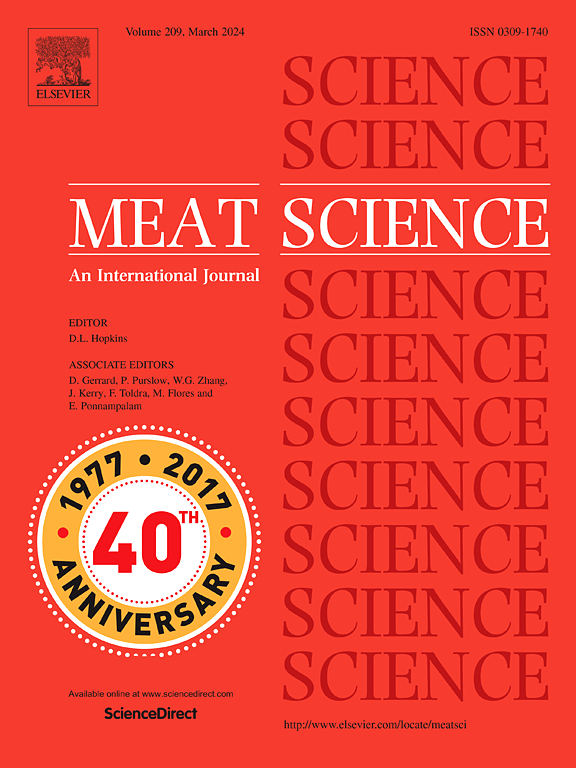Sodium chloride reduction in meat processing: Microbial shifts, spoilage risks, and metagenomic insights
IF 6.1
1区 农林科学
Q1 Agricultural and Biological Sciences
引用次数: 0
Abstract
This review evaluated the impact of sodium chloride (NaCl) reduction or substitution on the microbial ecology of meat products, with a focus on how these changes affect shelf life and safety. Reducing NaCl in fresh meat products promotes the growth of psychrotrophic spoilage bacteria, such as Pseudomonas sp., which thrive at low temperatures, and mesophilic pathogens like Escherichia coli and Staphylococcus aureus, particularly under inadequate storage conditions. In cured and fermented meats, such as salami, lowering NaCl levels disrupts the balance of salt-tolerant microorganisms, notably lactic acid bacteria (LAB) and coagulase-negative staphylococci, potentially leading to increased spoilage and pathogen proliferation. In smoked meats, the combination of reduced NaCl and altered microbial ecology, including a shift toward LAB dominance, may weaken the inhibitory effects on spore-forming bacteria like Clostridium botulinum. Additionally, using metagenomics, we explore the shifts in microbial communities observed in studies involving meat, revealing critical insights into the composition and diversity of bacteria in meat products, as well as the gaps in research on the impact of NaCl reduction and/or substitution on the microbiota. This review provides a comprehensive understanding of these microbial shifts, highlighting the distinct responses of psychrotrophic, mesophilic, and LAB groups to NaCl modification and the need to understand the effects of these alternatives on the meat product microbiome, as well as the neglected microorganisms that can affect the quality and safety of these products.
肉类加工中氯化钠的减少:微生物转移,腐败风险和宏基因组的见解
本综述评估了氯化钠(NaCl)还原或替代对肉制品微生物生态的影响,重点是这些变化如何影响保质期和安全性。鲜肉产品中减少NaCl会促进在低温下繁殖的嗜冷性腐败细菌(如假单胞菌)和中温性病原体(如大肠杆菌和金黄色葡萄球菌)的生长,尤其是在不适当的储存条件下。在腊肠等腌制和发酵肉类中,降低NaCl水平会破坏耐盐微生物的平衡,尤其是乳酸菌(LAB)和凝固酶阴性葡萄球菌,可能导致腐败和病原体增殖增加。在烟熏肉中,NaCl的减少和微生物生态的改变,包括向LAB优势的转变,可能会削弱对肉毒杆菌等芽孢形成细菌的抑制作用。此外,利用宏基因组学,我们探索了在涉及肉类的研究中观察到的微生物群落的变化,揭示了肉制品中细菌组成和多样性的重要见解,以及NaCl还原和/或替代对微生物群影响的研究空白。这篇综述提供了对这些微生物变化的全面理解,强调了嗜冷性、中温性和乳酸菌群对NaCl修饰的不同反应,以及了解这些替代品对肉制品微生物组的影响的必要性,以及可能影响这些产品质量和安全的被忽视的微生物。
本文章由计算机程序翻译,如有差异,请以英文原文为准。
求助全文
约1分钟内获得全文
求助全文
来源期刊

Meat Science
工程技术-食品科技
CiteScore
12.60
自引率
9.90%
发文量
282
审稿时长
60 days
期刊介绍:
The aim of Meat Science is to serve as a suitable platform for the dissemination of interdisciplinary and international knowledge on all factors influencing the properties of meat. While the journal primarily focuses on the flesh of mammals, contributions related to poultry will be considered if they enhance the overall understanding of the relationship between muscle nature and meat quality post mortem. Additionally, papers on large birds (e.g., emus, ostriches) as well as wild-captured mammals and crocodiles will be welcomed.
 求助内容:
求助内容: 应助结果提醒方式:
应助结果提醒方式:


